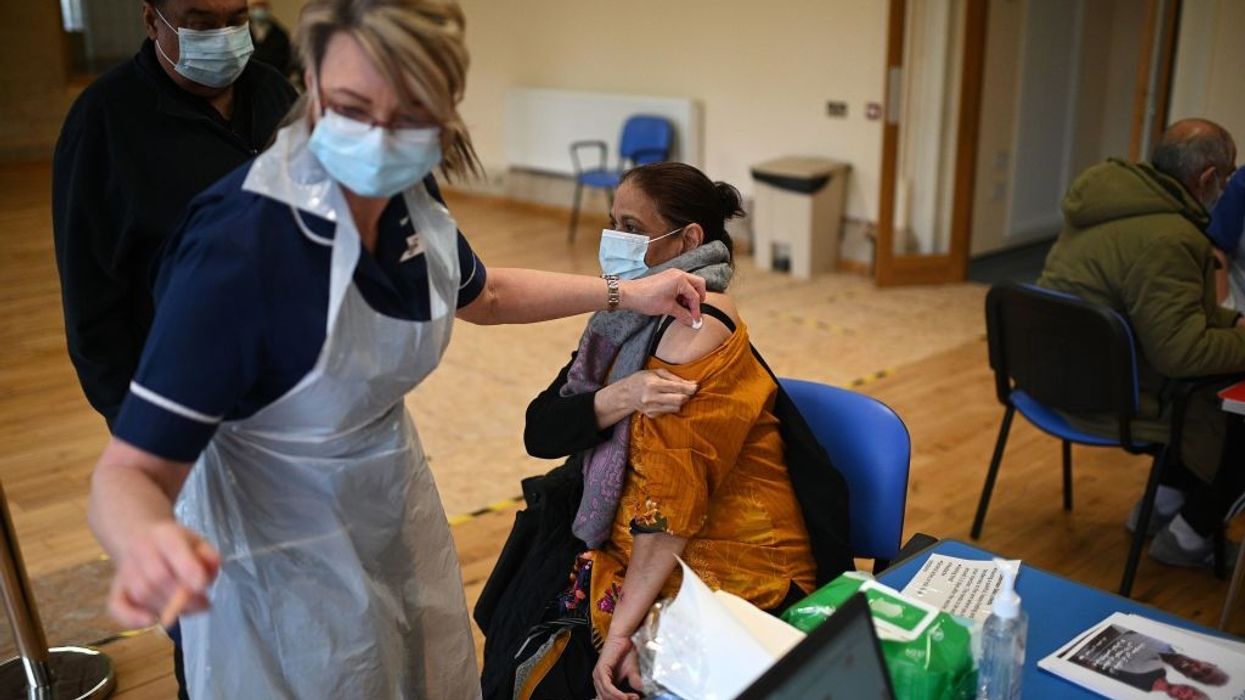CORONAVIRUS vaccines do not contain pork or make you infertile: a celebrity advertising campaign is striving to counter a worrying lag among certain ethnic minorities affecting Britain's otherwise impressive inoculation rollout.
But, experts argue, anti-disinformation drives need to overcome mistrust of the government among black and South Asian people, who have been dying in disproportionate numbers from Covid-19 but who remain scarred by endemic racism and past drugs scandals.
"This isn't about blaming individuals," according to Nikita Kanani, medical director of primary care for NHS (National Health Service) England.
She told a briefing organised by the British Asian Trust to encourage vaccine take-up that a lack of trust goes back "centuries" in some communities, citing "traumatic" experiences such as inappropriate testing of drugs on black people.
"What we want to do, what we need to do, is move past that to make sure people get the vaccine," Kanani said.
The government has been working with faith and community leaders, establishing vaccination hubs at mosques, temples and gurdwaras.
Imams are counselling Muslims that taking a vaccine does not breach the fasting month of Ramadan, which starts in mid-April. Both Muslims and Jews have been assured the jabs do not contain pork, or foetal stem cells.
Initiatives include a new TV campaign featuring well-known black and South Asian celebrities. One notes that the Pfizer-BioNTech vaccine was developed by a German-Turkish Muslim couple.
That vaccine and another developed by Oxford University and AstraZeneca are just as safe for ethnic minorities as for white people, the campaign stresses.
"There is no chip or tracker in the vaccine to keep watching where you go," comedian and TV presenter Romesh Ranganathan adds. "Your mobile phone actually does a much better job of that."
About 86 per cent of the UK population is white, and take-up of the vaccines since the world's first inoculation campaign launched in December is running at around 90 per cent.
The government plans to offer a first dose to every adult by the end of July. But isolated Covid hotspots could persist if hesitancy lingers among certain demographics.
Lower uptake
The infection rate among the Hasidic Jewish community in London's Stamford Hill area was 64 per cent in early December, one of the highest rates recorded anywhere in the world, according to the London School of Hygiene and Tropical Medicine.
Figures from OpenSAFELY, a database run by the London school and Oxford University, showed that vaccine take-up by early February among Bangladeshi and Pakistani communities stood at just 59 per cent.
Among people of African heritage, it was under 49 per cent, although later data suggest the gap has narrowed slightly.
Britain's largest black African population is from Nigeria, where anger remains over the deaths of 11 children in 1996 after they were administered an experimental meningitis vaccine by Pfizer.
"We have to be honest and admit that there have been reasons why there has been mistrust between the black community and healthcare systems," medical professor Toyin Falusi Nwafor told the Nigerian faithful of north London's Jesus House church, in a YouTube webinar.
The US-based doctor highlighted the notorious Tuskegee experiment, when government scientists monitored African-American men with syphilis for 40 years without giving them treatment.
In Britain, as in the US, ethnic minorities are disproportionately present in lower-paid jobs and overcrowded housing, and have more pre-existing health conditions such as diabetes -- factors which make them more vulnerable to Covid-19.
Black British men are nearly three times more likely to die of the virus than white men, according to the Office for National Statistics. Mortality rates among people of Bangladeshi ethnicity are twice as high.
There are persistent complaints among some minorities that their concerns are not taken seriously by white medics.
Black women are five times more likely to die in childbirth in NHS hospitals than white ones, and more than 60 per cent of black people do not believe their health is equally protected, according to a cross-party parliamentary report in November.





